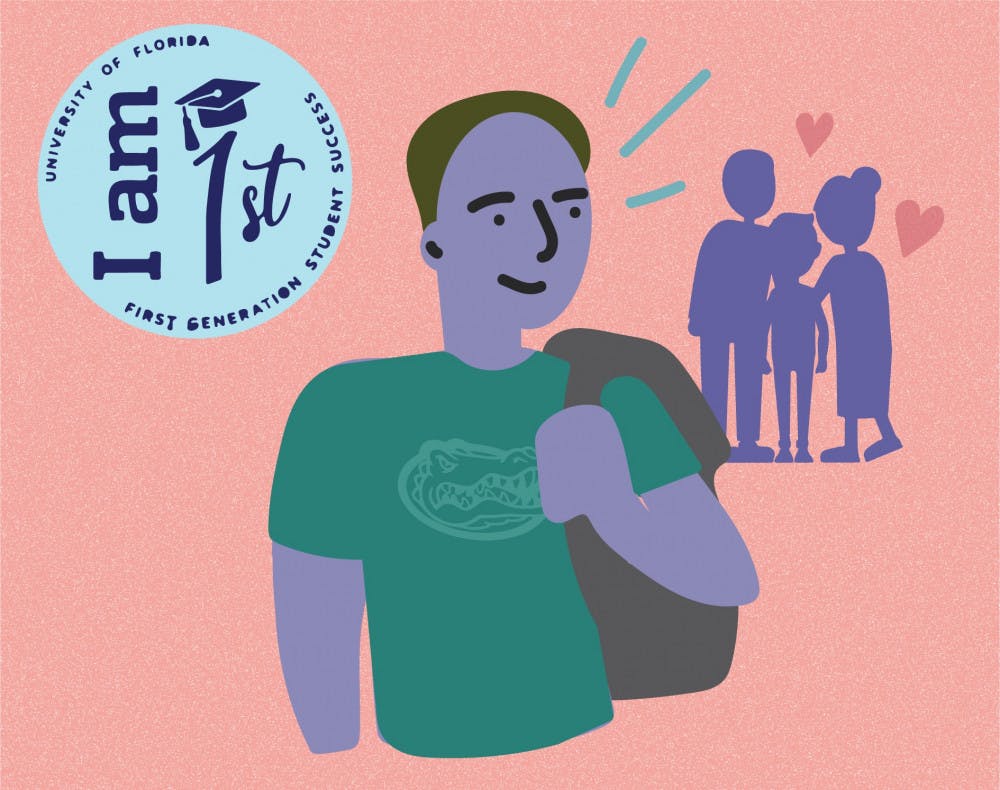Sarah Gutierrez’s parents couldn’t tell her what to expect from college.
Gutierrez, an 18-year-old UF psychology freshman, is the first person in her family to attend college, though her experience so far has been online only.
Since COVID-19 began to spread in the U.S. in March, Gutierrez’s and the plans of other first-generation students have had to readjust. Navigating UF without familial guidance is challenging, more so in the middle of a pandemic, but they have found ways to push forward.
Gutierrez is a UF Machen Florida Opportunity Scholarship and a Bright Futures recipient, which means all her educational expenses are paid for. Although she wanted to live on campus, she decided to stay home in Miami during the Fall due to the pandemic.
Before starting college, she said she was excited about finally arriving on campus and experiencing Preview, UF’s student orientation, in person. When the semester went mostly online, she worried about not being able to meet people.
“I really wanted to at least know someone before going to college,“ Gutierrez said.
Gutierrez’s dad is Honduran and her mom Guatemalan. She said that as a first-generation student, their hard work and encouragement has kept her moving forward.
The First-Generation Leadership Program, an organization founded over the Summer, has taught the freshman the ins and outs of UF. FGLP focuses on expanding the access of first-generation freshmen to resources and leadership opportunities at UF.
“Even though everything is virtual, I feel like this is enough for me,” Gutierrez said. “This program really is about lifting each other up and not competing with one another.”
As the first in his family to attend college, Daniel Badell, FGLP founder and 19-year-old UF political science sophomore, said he understands the struggles other first-generation students may go through and wants to help them succeed from their early stages at UF.
“I knew that freshmen stepping into the program weren't going to have the same university experience that I had as a freshman,” Badell said. “We were creating the program in the developments of COVID — in the development of the world turning virtual.”
This Fall, about 85 first-generation freshmen applied to be part of FGLP and only 30 were selected to ensure that mentor-mentee relationships will be strong throughout the year, Badell said. The program will conduct all of its meetings through Zoom.
It is important for first-generation students to have a community of people who have had similar struggles as them to empower, support and motivate each other, Badell said.
About 15% of UF’s student population is first-generation, wrote in an email Erica Aguiar, the assistant director for the Machen Florida Opportunity Scholars program and First-Generation Student Success.
Andrea Jorratt, a 20-year-old UF anthropology and microbiology and cell sciences junior, said the Summer was hectic. She was taking four UF online courses while at home in Davie.
“It was a lot of adjusting to new ways of taking classes,” Jorratt said, “adjusting to new definitions of what it means to be a student at the university while there's an ongoing pandemic.”
As a first generation student, it felt difficult to meet new people and remain involved on campus this Summer, she said. However, she felt more productive because all she could do while at home was studying.
Being a first-generation student means setting an example in the family for future generations to follow, Jorratt said.
“It's a lot of fun,” she said. “It's a lot of stress because you always have that weight on your shoulder.”
Jorratt is now back in Gainesville but said that if things become too stressful at any point in the semester, she could go home if she wanted.
For Mombo Ngu, an 18-year-old first-generation UF sociology sophomore, going online when the pandemic hit was difficult because she prefers learning in an in-person setting.
She had to adjust to online learning and being back home in Jacksonville with her mom and her 16-year-old sister.
“Trying to adjust back to living with your parents, after you've been in school for so long could be like ‘Ah!’, kinda difficult,” Ngu said, “but I was able to adjust over time.”
Ngu didn’t have a designated space to study and take exams at home because her family lives in a small house and the three of them were always there, she said.
Though Ngu’s situation wasn’t optimal, she took two Summer A courses: statistics and medical terminology. Both courses went better than her courses in Spring because they were designated to be taught online, she said.
“Having that already virtual kind of expectation helped,” Ngu said.
Now, Ngu said she is glad to be back in Gainesville because she has her own space and more independence.
Ngu said being a first-generation student has taught her to be resilient when things don’t go as expected, which has helped her cope with COVID-19. When she realized the pandemic was not something she could change, she decided to move forward and focus on things she can control, such as her academic performance.
“You're always pushing for success and pushing for a better life for yourself and your family,” Ngu said.

Aurora Martínez is a journalism senior and the digital managing editor for The Alligator. When life gives her a break, she loves doing jigsaw puzzles, reading Modern Love stories and spending quality time with friends.






